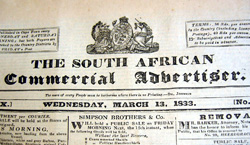This Day in History: April 29, 1829
Additional Date: April 29, 1829
The freedom of the press was established in the Cape Colony through the efforts of journalist John Fairbairn, founder of The South African Commercial Advertiser. After Cape governor Lord Charles Somerset had repeatedly censored the newspaper, Fairbairn appealed to the British government and gained the right to publish without hindrance. This led to what became known as the "Magna Carta" of press freedom in South Africa, and concerned the proclamation of Ordinance No 60, the so-called "Press Ordinance". According to one source the date is May 8, 1829, but according to two other sources, it was promulgated on April 29, 1829, and took effect on May 15. John Fairbairn who fought to have this ordinance - though it had limitations - accepted, is today one of the honoured names in the history of press freedom in our country. The colonists were so happy with this new freedom, that they acknowledged their appreciation with a gift in the form of a priceless silver vase at a somewhat exorbitant price of 2 000 rixdollars.
